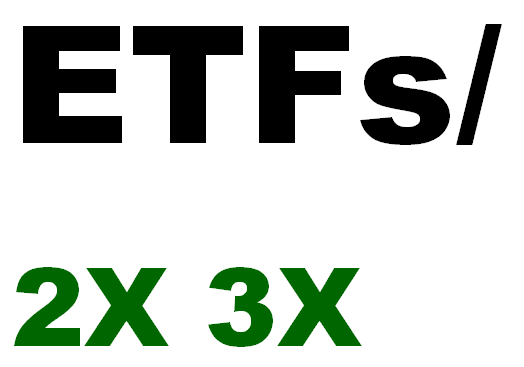SSO 2x Leveraged ETF SPY Financial Swaps
Post on: 12 Июнь, 2015 No Comment

SSO is a leveraged S&P 500 index fund. Maintained by ProShares, it returns about twice the daily change of an index fund. But its expense ratio is much higher. It uses financial swaps to achieve these returns.
Intro
The SSO ETF has returns similar to a double-leveraged S&P 500 index fund. But there are complexities involved. The fund is not equal to having a margin account with two times the shares of stock.
Instead: The fund uses financial swaps to gain the price movement of 2x the return of the S&P index.
This Ultra ProShares ETF seeks a return that is 2x the return of an index or other benchmark (target) for a single day.
Dividends
The SSO fund pays dividends. The amount paid varies widely, from less than a cent to 42 cents. This depends partly on when the stock was last split. The fund pays dividends because the IRS requires it.
Note: SSO uses financial derivatives. Some of these derivatives may result in capital gains, which must be paid in dividends.
All ETFs are required by IRS regulations to distribute substantially all of their net investment income and capital gains to shareholders at least annually.
Long-term
Should you hold SSO (or other leveraged ETFs) in the long-term? This depends on your goals. The fund managers (ProShares) caution that investors should monitor their holdings as often as daily.
However: If you have a high risk tolerance, and want a high reward, there is nothing wrong with holding SSO for many months or years.
And: Even Ayres, a Yale economist, suggests holding a leveraged mutual fund nearly equivalent to SSO.
Performance
Does SSO outperform an index fund like SPY in the long-term? I compared performance of SSO and SPY since mid-2006. SPY (which holds the S&P 500 index, without leverage) went up by 35.67%.
And: SSO, which holds the S&P 500 index with two times leverage, increased by 20.42%.
This means that SPY outperforms the leveraged SSO by a considerable amount. Another factor is dividends. SPY pays more dividends that SSO (the yields vary depending on the current share prices of the moment).
So: SPY has outperformed SSO. However, this does not mean it will continue to outperform forever.
According to the research by Ayres, a leveraged ETF will outperform in the extreme long term (periods of 10+ years). This chart only shows six years. The leverage should help if more time passes.
Holdings
What are the holdings of the SSO fund? I referenced the holdings page on the MorningStar page for the fund. The top holding currently (July 2013) is an SPDR S&P 500 (SPY) Swap from Deutsche Bank.
So: Part of the SSO fund is actually borrowed shares from the SPY index fund. SSO and SPY involve the same shares of stock.
What is a swap? We have to figure out what a financial swap is to continue. Wikipedia states a swap is a financial derivative. Two parties trade the cash flows of two financial instruments.
Tip: A financial instrument is any legal contract that involves money (like a check). I remember from my business law class in college.
In finance, a swap is a derivative in which counterparties exchange cash flows of one party’s financial instrument for those of the other party’s financial instrument.
Swap, Finance: Wikipedia
In simple terms, the SSO borrows shares from Deutsche Bank, which holds the SPY index fund. SSO holds many other swaps, including some from Morgan Stanley, Goldman Sachs, and Merrill Lynch.
Stock holdings. In addition to the swaps, which add up to more than 100% of the portfolio weight, the SSO fund owns shares of the S&P companies (based on float weights).
This starts with Exxon,
Apple
and Microsoft.
Margin. The SSO fund currently has -99.97% cash. This means it has borrowed an amount equal to its equity holdings. This money would be used for the financial swaps. Currently, the fund only holds 153.28% of its assets in stock.
Beta
The beta of SSO is currently equal to 2.04 on Google Finance. Beta is used to measure change relative to the overall market change. It is typically measured against the S&P 500 index.
So: SSO has a beta about twice that of the S&P 500 index. A fund like SPY (the index) has a beta of 1.
Risk: Beta measures risk relative to an equivalent fund. But it does not account for certain forms of risk, like a bad quarterly report.
Commission
Most brokerages now offer no-commission S&P 500 index funds. Fidelity offers IVV. Vanguard offers VOO. And Charles Schwab offers SCHB or SCHX. Some of these funds may be total-market funds, not just S&P 500.
However: No brokerages currently offer SSO with no commission. This is a specialty fund, with a narrower target audience.
This means that commissions will eat into your total returns with SSO. Over the years an $8 commission on each trade will start to add up. At this rate, the minimum to buy SSO is $16one buy and one sell.
Companies
Taking a step back, let us consider what companies are the largest holdings in SSO. These are the same companies held in SPY, or the S&P 500 index. But still it helps us to consider the fundamentals.
Tip: As with SPY, SSO is mainly composed of mega-cap companies. This is the case too with the S&P 500 index itself.
Summary
Investment strategies differ. And even if a leveraged ETF like SSO produces superior returns, it may not be suitable for your personality. It accentuates gains, but multiplies losses as well. SSO is worth considering.














